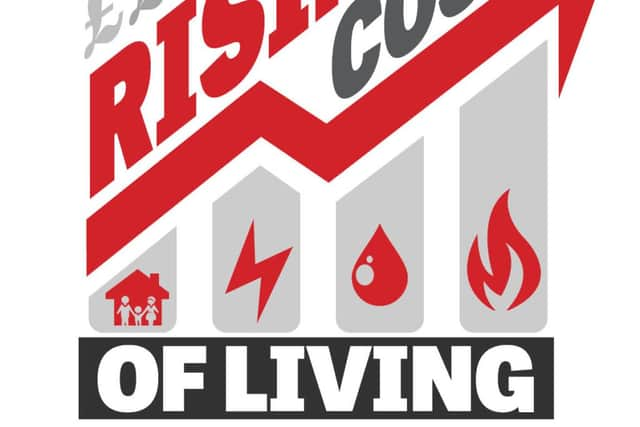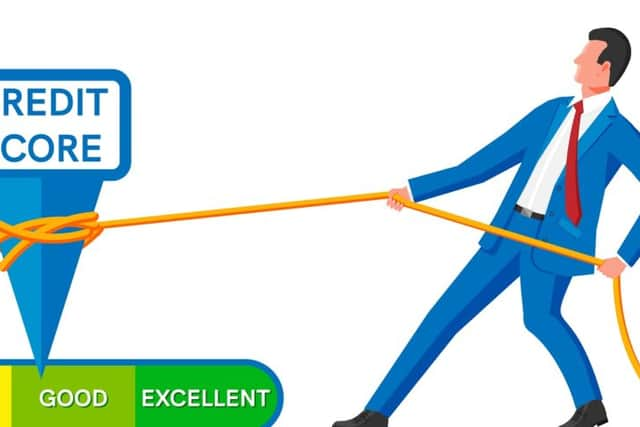Tackling the rising cost of living - Top tips to give your credit rating a boost


Our Cost of Living campaign - Price Watch highlights the impact of price hikes on our readers


With the cost of living on the rise, getting the best financial deals has never been more crucial. To do so, it is important to have a good credit score.
Advertisement
Hide AdAdvertisement
Hide AdTo help consumers identify true from false financial advice online, credit card brand Aqua has worked with their in-house financial experts to debunk the biggest misconceptions online surrounding credit.






MYTH-BUSTING – FIVE TIPS TO IMPROVE YOUR CREDIT SCORE:
1 Regularly check your credit report: Keep a close eye on your credit report and watch out for any incorrect details.
A small mistake can impact your credit score negatively so if you spot anything that looks wrong, report it as soon as possible.
2 Get - and use - a credit card:
Using a credit card for some of your purchases and making sure you pay it off on time each month is a great way to prove that you’re creditworthy.
Advertisement
Hide AdAdvertisement
Hide AdMaking regular payments in full shows lenders your ability to pay back debts you owe and may help your credit score improve.
3 Pay your bills on time:
Paying your bills on time demonstrates your ability to manage your money well. Late bill payments can signal to lenders that you might not be in control of your finances and could struggle to pay back the money that you owe, so always do your best to make payments on time.
4 Stay on top of any existing debt:
Having existing debt could make it difficult to be accepted for future credit applications. So, it’s key to assess what existing credit you have and make sure you’re making regular monthly payments to reduce it.
It could be helpful to make a list of everything you owe and when each payment is due, so you have full visibility of your financial situation.
5 Set up direct debits:
Advertisement
Hide AdAdvertisement
Hide AdArranging direct debits for your bill payments makes sure you never miss or make a late payment, which we know can impact your credit score.
There are more than 40,000 Google searches per month by Brits asking how to check your credit score, showing many remain confused or unaware.


Credit scores impact
countless aspects of our lives yet, there are so many myths around how they work, how your credit score is calculated and how to build better credit.
Through research on Reddit, Google and credit reference agencies, Aqua has revealed and debunked the biggest misconceptions online surrounding credit.


DEBUNKING THE INTERNET’S SIX MOST POPULAR CREDIT MYTHS:
1 ‘You only have one credit score’ – False.
Advertisement
Hide AdAdvertisement
Hide AdNobody has one single static credit score, because every credit reference agency uses different metrics and criteria in their calculations.
2 ‘Checking my credit score affects my credit rating’ – True and false.
Two ways you can check your credit score: Soft credit check – This does not impact your credit score, and is an initial look at your credit report.
Hard credit check: This does impact your credit score and is a more in-depth credit check used by lenders.
Advertisement
Hide AdAdvertisement
Hide Ad3 ‘Better salary and more savings equals a better credit score’ – False.
While your income and savings are considered when determining your ability to pay back the amount of money you will borrow, they have no influence at all on your credit score.
4 ‘If you’ve never borrowed, you’ll get the best deals’ – False.
If you’ve never borrowed, you’re actually more likely to be rejected for the credit cards, mortgages and loans with the best deals as there’s no way for a lender to see that you’ll be able to make your payments successfully.
Advertisement
Hide AdAdvertisement
Hide Ad5 ‘Repaying your credit cards in full lowers your credit score’ – False.
Repaying your credit card statement balance in full each month is a great financial move and may, in fact, increase your credit score.
6 ‘My credit rating is horrible, but the damage is done and there’s nothing I can do about it’ - False.
It might take time, but there are some simple steps you can take to positively affect your credit score, such as registering to vote or closing down accounts you don’t use.
Advertisement
Hide AdAdvertisement
Hide AdAqua commercial director Sharvan Selvam said: “It’s important to separate fact from fiction when it comes to credit scores to ensure you take the right steps on your credit journey.
"Using a reputable source to get your financial information and talking to your bank or credit provider will help you make better financial decisions and find the credit product that is right for you.”